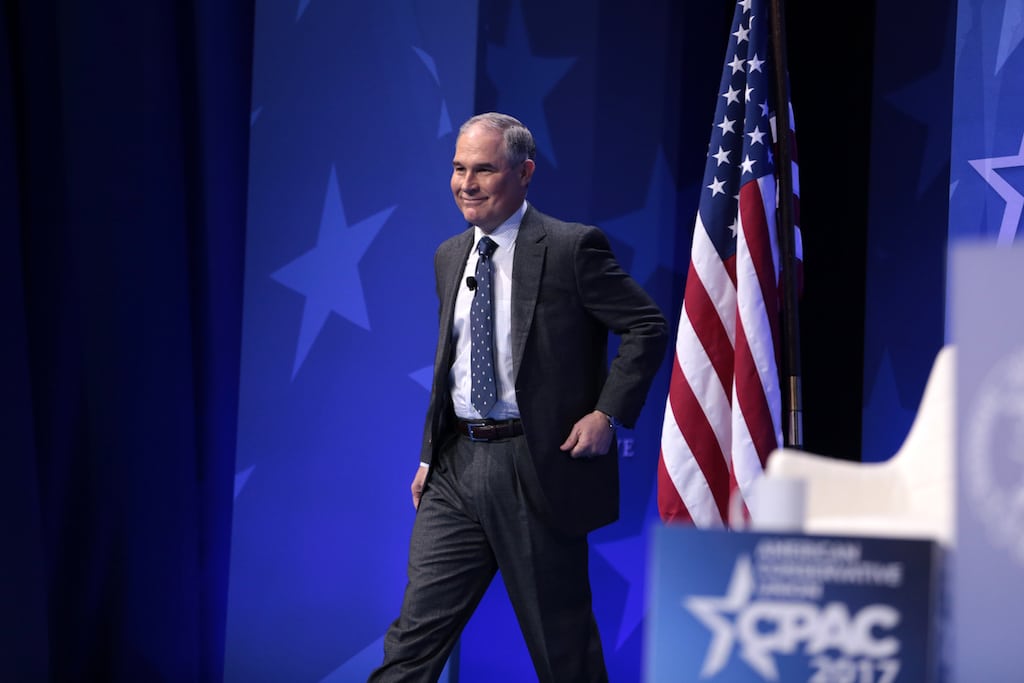Skift Take
Corporate travel policies are restrictive, and perhaps no organization is as restrictive as the U.S. government. The Scott Pruitt scandal is a good reminder that business travel is an important part of life wherever you happen to work. Everyone wants to live the good life, but few really can.
Business travel is frustrating. Nobody really wants to fly across the country in the middle seat on a delayed flight, only to end up in an economy hotel next to a freeway due to restrictions on where you can stay and how much you can spend.
Wouldn’t it be better to fly around the world first-class or on a private jet, staying at whatever fancy hotel you want, accompanied by a security staff to whisk you around wherever you need? Sounds like the life, honestly.
The unfolding saga this week of Environmental Protection Agency administrator Scott Pruitt’s alleged lavish spending on travel is partly a disturbing tale of excess, but also a tribute to the agony of business travel and the draconian methods organizations use to impose a travel policy on employees.
The U.S. government is a bureaucracy nonpareil, and its fragmented nature means employees regularly game the system when they travel. Government travel is serviced by a variety of travel management companies including giant players like SAP Concur and Carlson Wagonlit Travel. American Express Global Business Travel and Omega Travel also provide meetings management services. There’s even a hotel booking site!
Basically, the average federal employee is allowed to fly economy on a U.S. carrier without additional permission. Renting a car, traveling abroad, or attending a conference requires authorization. Per diems are also strictly limited depending on where someone travels to.
A letter from Democratic leaders details Pruitt’s outlandish travel demands. They include an attempt to sign a $100,000 per month contract for private jet service, frequent stays at hotels far exceeding per diem rates allowed by regulation, and Pruitt ordering his staff to book flights only on Delta Air Lines to rack up frequent flyer miles from the airline.
In the case of the Environmental Protection Agency, in particular, this isn’t even the first travel spending scandal in recent years, according to reports from the organization’s inspector general.
Travel Policy Matters
This isn’t a system set up for traveler satisfaction, obviously, since the government has a duty to avoid wasteful spending.
The Federal Travel Regulation, which provides rules for how federal employees can travel and what they can expense, is a whopping 336 pages long. The General Services Administration recently discontinued online training for Federal workers and only offers training events around Washington, D.C., so it’s likely there is a major education gap for government employees.
The reality is that a travel policy can, and should, be brief. For instance: Hotel stays can cost this much per night, you can fly only in economy class, and please don’t bring your cat along, we’re not paying for it. Government travel adds many layers of additional complexity ranging from safety and security to complicated reimbursement procedures.
Travel managers, in general, have a documented problem with educating their travelers. A survey from the Global Business Travel Association showed that while half of travel managers say they communicate policy in a training session each year, just 20 percent of travelers have any recollection of these training sessions.
While Pruitt’s ridiculous attempts to take advantage of taxpayer funding are particularly egregious if true, they also reveal a basic truth about business travel: nobody wants an unpleasant business travel experience. Some of us will go to drastic and unscrupulous lengths to avoid it, but most stoically suffer through it countless times to save their company a few dollars.
The Federal Travel Regulation calls for a fine of no more than $10,000 and jail time of up to five years for defrauding the government with respect to travel. The average business travel experience is so bad that Pruitt possibly risked jail time in order to fly first-class.
Most business travelers don’t face a fine when they break policy or try to expense their night closing down the hotel bar. But it’s worth thinking about exactly why business travel can be such a miserable endeavor, and what can be done to make it better.
This story has been updated to include more information on the allegations against Pruitt.
The Daily Newsletter
Our daily coverage of the global travel industry. Written by editors and analysts from across Skift’s brands.
Have a confidential tip for Skift? Get in touch
Tags: business travel, corporate travel, ctir, travel policy
Photo credit: EPA administrator Scott Pruitt walks onstage at CPAC 2017. The latest allegations against Pruitt are proof that business travel stinks for the majority of travelers. Gage Skidmore / Flickr
